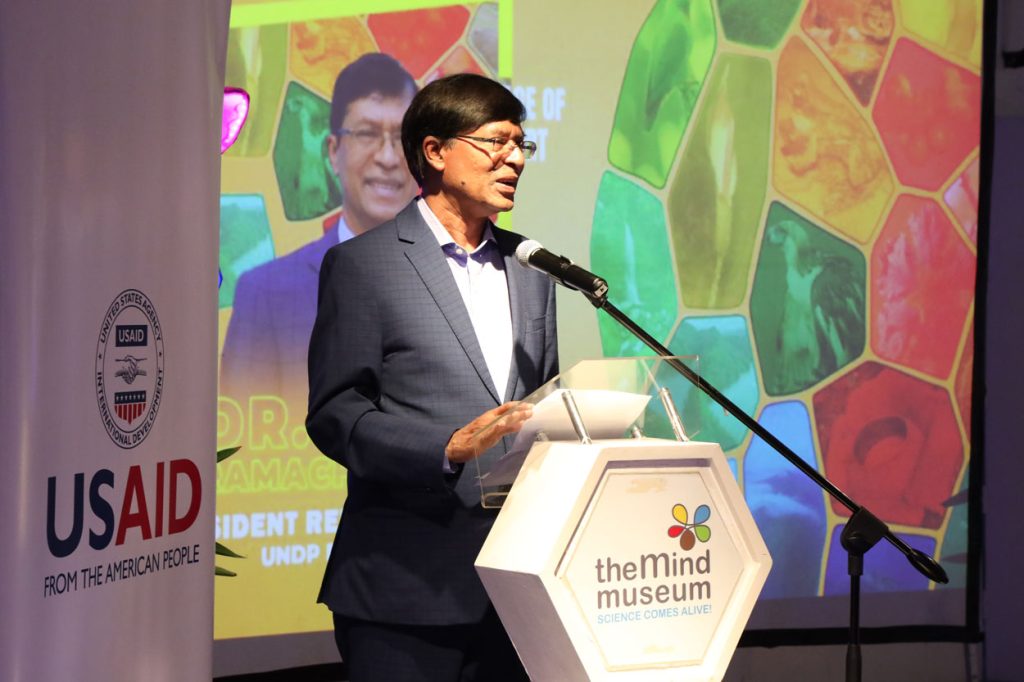 United Nations Development Program (UNDP) Philippines Resident Representative Dr. Selva Ramachandran expressed the importance of collaboration to protect and preserve biodiversity on the planet and achieve the goals and targets of the Kunming-Montreal Global Biodiversity Framework (KMGBF).
United Nations Development Program (UNDP) Philippines Resident Representative Dr. Selva Ramachandran expressed the importance of collaboration to protect and preserve biodiversity on the planet and achieve the goals and targets of the Kunming-Montreal Global Biodiversity Framework (KMGBF).
“The plan to save the world’s biodiversity is an ambitious one, but it is possible through our collective efforts,” Ramachandran said during the celebration of the International Day for Biological Diversity with the theme “Be Part of the Plan” held on May 22 in Taguig City.
Department of Environment and Natural Resources Secretary Maria Antonia Yulo Loyzaga echoes this statement and has said that biodiversity conservation results from a collective commitment to preserve the Philippines’ natural treasures. She enjoins DENR partners to continue to champion the cause of environmental stewardship, ensuring that the country’s natural wonders are safeguarded for the benefit of all.
Ramachandran said the UNDP is part of the Plan that is aligned with UNDP’s Nature Pledge, a multi-year, high-ambition corporate commitment to accelerate global environmental action at scale for the benefit of people, planet, peace, and prosperity
UNDP has partnered with civil society organizations, academe, indigenous peoples, local communities, private sector and agencies to ensure a common agenda and unify efforts to meet the targets of the Philippines and the GBF.
According to Ramachandran, The Nature Pledge, which gives importance to nature and biodiversity, offers three transformational shifts that support UNDP’s acceleration targets under the GBF, and require concerted and integrated efforts on a massive scale.
* Systems change and value shift. There is need to rewrite narratives and catalyze behavior change. Ramacahndran said nature is our greatest asset and most powerful ally and therefore we need to change the misconceptions that environmental interests and development and economic interests are a tradeoff.
* Economic and finance shift. This places nature in balance sheets, financial reports, development theories, business plans, insurance policies and many more. To hasten such shift, the UNDP is exploring the development of innovative finance such as “green” and “blue” bonds, biodiversity credits and other finance mechanisms. Green bonds are among financing options to generate funds for environment-friendly investments. On the other hand, blue bond is a debt instrument issued by governments to raise capital to finance marine and ocean-based projects.
* Policy and practice shift. This includes policy coherence so that successes on one front are not eclipsed by policies in other sectors, thereby bringing about net negative impacts. “Our work on circular economy, climate adaptation, mitigation and resilience all add up to reinforce the value of and addressing multiple threats to nature and biodiversity,” Ramachandran said.
UNDP programs with DENR and its partners are expected to improve the management of some 300,000 hectares of other effective area-based conservation measures, including Local Conservation Areas and Indigenous Community Conserved Areas, 15 protected areas, and influence agricultural, forest and mining practices in these landscapes.
Equitable distribution of benefits and livelihood development will reinforce the work with local communities and indigenous peoples by marshalling their capacities, traditional knowledge and the economic value of the country’s genetic resources.
“At the strategic level, I am glad that our cooperation with the DENR and partners has significantly moved towards accelerating actions to achieve the GBF targets”, he stressed.
The updating of the Philippine Biodiversity Strategy and Action Plan (PBSAP) is guided by this global ambition and the Philippines commitment. Through the Early Action Support Facility, an action plan for expanding marine biodiversity protection to align with 30 x 30 targets is being developed to support PBSAP.
Ramachandran said that with the huge financing gap for biodiversity management now, and the projection that the financing requirements will certainly increase as the KM-GBF targets are ambitious and require an accelerated approach, UNDP is working with partners to strengthen the private sector’s role in redirecting finance flows towards nature-positive outcomes.###












